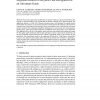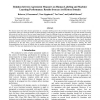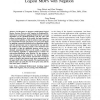51 search results - page 1 / 11 » Learning to Assign Degrees of Belief in Relational Domains |
ILP
2007
Springer
13 years 10 months ago
2007
Springer
A recurrent question in the design of intelligent agents is how to assign degrees of beliefs, or subjective probabilities, to various events in a relational environment. In the sta...
UMUAI
1998
13 years 4 months ago
1998
We present an approach to keyhole plan recognition which uses a dynamic belief (Bayesian) network to represent features of the domain that are needed to identify users’ plans and...
LREC
2008
13 years 5 months ago
2008
We discuss factors that affect human agreement on a semantic labeling task in the art history domain, based on the results of four experiments where we varied the number of labels...
JCP
2008
13 years 4 months ago
2008
In this paper, we propose a model named Logical Markov Decision Processes with Negation for Relational Reinforcement Learning for applying Reinforcement Learning algorithms on the ...
ICML
2008
IEEE
14 years 5 months ago
2008
IEEE
Deep Belief Networks (DBN's) are generative models that contain many layers of hidden variables. Efficient greedy algorithms for learning and approximate inference have allow...



